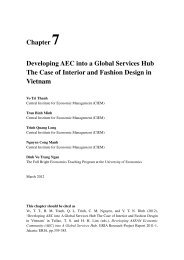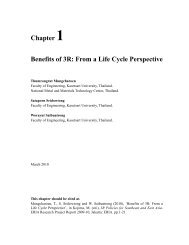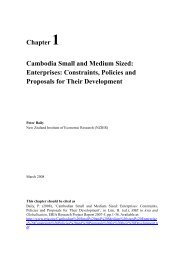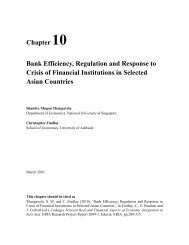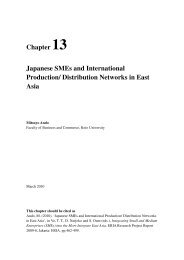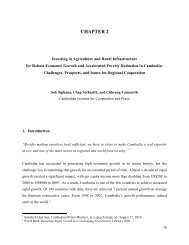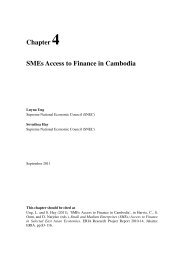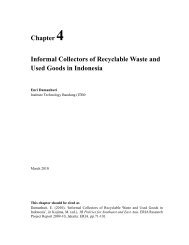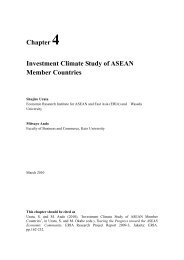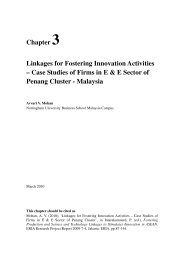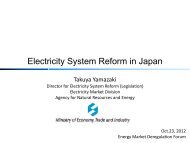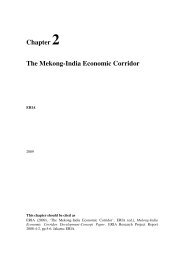- Page 1: ERIA Research Project Report 2011,
- Page 4 and 5: MR. GUMILANG ARYO SAHADEWO: Lecture
- Page 6 and 7: studies, and energy sector subsidie
- Page 8 and 9: faster growing energy demand when t
- Page 10 and 11: in the core chapters are then summa
- Page 12 and 13: developing optimal power generation
- Page 14 and 15: utilities, encompassing generation,
- Page 16 and 17: 7.36% (gas), 4.82% (paper & paper p
- Page 18 and 19: “sectoral approach”, should be
- Page 20 and 21: 1. IntroductionPrice and income are
- Page 22 and 23: and how much benefit each country c
- Page 24 and 25: Percentage of GrowthPrimary Energy
- Page 26 and 27: logarithm of energy consumption per
- Page 28 and 29: Based on the standard consumption f
- Page 30 and 31: fossil fuel products increase (or d
- Page 32 and 33: whereDitis a group of lagged indepe
- Page 34 and 35: use immediately and later, in the l
- Page 36 and 37: Energy consumption per capitadiffer
- Page 38 and 39: coefficients in front of the dummy
- Page 42 and 43: Bohi, D. R. and M. B. Zimmerman (19
- Page 44 and 45: CHAPTER 3Power Generation and Cross
- Page 46 and 47: of the Power Grid (Atchatavivan, 20
- Page 48 and 49: instantaneous power demand levels.
- Page 50 and 51: The third constraint, shown in equa
- Page 52 and 53: Table 1: Growth Rate of Power Deman
- Page 54 and 55: egimes on cross-border power trade
- Page 56 and 57: geothermal, and wind capacities and
- Page 58 and 59: There are a few reasons why natural
- Page 60 and 61: development paths of power generati
- Page 62 and 63: Economic Consulting Associates (ECA
- Page 64 and 65: Table A3: Energy Resources for Powe
- Page 66 and 67: CHAPTER 4Electricity Market Integra
- Page 68 and 69: Figure 1: World Electricity Consump
- Page 70 and 71: Figure 3: Sources of Electricity Ge
- Page 72 and 73: comparatively low and fairly respon
- Page 74 and 75: Table 2: Electricity Demand in EAS
- Page 76 and 77: The Australian electricity sector u
- Page 78 and 79: deregulation of retail power supply
- Page 80 and 81: (www.des.gov.bn) and Berakas Power
- Page 82 and 83: million kWhfrom Thailand and 1162 m
- Page 84 and 85: o consumer protection and safety st
- Page 86 and 87: CTE (2011), ‘Thai Power Sector’
- Page 88 and 89: PWC (2009), Electricity Industry in
- Page 90 and 91:
1. IntroductionIn the fifth EAS, le
- Page 92 and 93:
the same type located in the same r
- Page 94 and 95:
Figure 1: The Type of FDI in Electr
- Page 96 and 97:
usually running small power plants.
- Page 98 and 99:
Table 1: The Technical Efficiency o
- Page 100 and 101:
market which would determine the el
- Page 102 and 103:
electricity, power plants are place
- Page 104 and 105:
can directly negotiate deals. The g
- Page 106 and 107:
6. China’s Lesson and Policy Impl
- Page 108 and 109:
ReferenceZunfa C. (2010), ‘Six Ch
- Page 110 and 111:
1. IntroductionAll around the world
- Page 112 and 113:
Unbundling can reduce the disadvant
- Page 114:
intermediate structure at the initi
- Page 117 and 118:
well as reducing transmission and d
- Page 119 and 120:
Table 2: Split of ECNZYear ChangesA
- Page 121 and 122:
The reform promoted a wave of merge
- Page 123 and 124:
major generators may have significa
- Page 125 and 126:
4.3. TransmissionThe electricity tr
- Page 127 and 128:
to have defined geographic areas of
- Page 129 and 130:
Figure 3: Efficiency Scores (Consta
- Page 131 and 132:
Figure 6: kWh-transmitted Weighted
- Page 133 and 134:
Figure 8: Retail Electricity Prices
- Page 135 and 136:
energy affordability issues the eff
- Page 137 and 138:
distribution businesses may discrim
- Page 139 and 140:
generation, distribution and retail
- Page 141 and 142:
Furthermore, the unbundling does no
- Page 143 and 144:
Arestis, P. and M. Sawyer (eds.), C
- Page 145 and 146:
Tirole, J. (1988), The Theory of In
- Page 147 and 148:
1. IntroductionEnergy cooperation i
- Page 149 and 150:
physical infrastructure had been de
- Page 151 and 152:
Although the Electricity Authority
- Page 153 and 154:
According to the Asian Development
- Page 155 and 156:
Table 4: Electricity Tariff of EDC
- Page 157 and 158:
2008). Overall power loss for the c
- Page 159 and 160:
IPPs, REEs, and other licensees tha
- Page 161 and 162:
4.2.1. Ministry of Industry, Mines
- Page 163 and 164:
2. National Transmission License: g
- Page 165 and 166:
5. Regional Cooperation and Trade5.
- Page 167 and 168:
Cambodia joined ASEAN as the 10 th
- Page 169 and 170:
Table 11: Generation Master Plan 20
- Page 171 and 172:
various connections and currently a
- Page 173 and 174:
Regarding big energy investment (ov
- Page 175 and 176:
7. Concluding RemarksSources in the
- Page 177 and 178:
EDC (2010), EDC Annual Report 2010.
- Page 179 and 180:
1. IntroductionThis research starts
- Page 181 and 182:
Table 1: Subsidy Expenditure in Ind
- Page 183 and 184:
2. Literature Review2.1. Fuel subsi
- Page 185 and 186:
Chateau (2011) would bring both eco
- Page 187 and 188:
Chateau, 2011). Burniaux and Chatea
- Page 189 and 190:
linkage effect explains that decrea
- Page 191 and 192:
Table 3: Social Accounting Matrix F
- Page 193 and 194:
Changes in the output multipliers i
- Page 195 and 196:
Table 6: Multiplier Analysis of SAM
- Page 197 and 198:
Table 8: Priority Sectors for Reall
- Page 199 and 200:
impact are: 1) chemical and cement
- Page 201 and 202:
Figure 5: Distributional Effect of
- Page 203 and 204:
Figure 7: Distributional Effect of
- Page 205 and 206:
Figure 9: Distributional Effect of
- Page 207 and 208:
continuing compensation programs fo
- Page 209 and 210:
International Energy Agency (IEA) (
- Page 211 and 212:
AppendixSectoral Reallocation Impac
- Page 213 and 214:
1. IntroductionThe East Asian (EA)
- Page 215 and 216:
Table 1: Fuel Subsidy in Malaysia 1
- Page 217 and 218:
Key Reasons Why Subsidy Needs to Be
- Page 219 and 220:
particularly at the Malaysian borde
- Page 221 and 222:
Figure 4 shows different magnitudes
- Page 223 and 224:
The United Nations Environment Prog
- Page 225 and 226:
All these assumptions are less real
- Page 227 and 228:
Since ( I - A ) -1 ( I - A ) = I, t
- Page 229 and 230:
fuel located at the total intermedi
- Page 231 and 232:
taxes include output taxes or subsi
- Page 233 and 234:
Table 7: Database Component of MIER
- Page 235 and 236:
Table 8: Malaysia GDP from Expendit
- Page 237 and 238:
Figure 6: Price Increase by Removal
- Page 239 and 240:
symbol star, i.e.* represents augme
- Page 241 and 242:
Table 11: Effects of Subsidy Remova
- Page 243 and 244:
Figure 8: Change of 10 % Indirect T
- Page 245 and 246:
unchanged, (the introduction of dum
- Page 247 and 248:
matters because it is the autonomou
- Page 249 and 250:
some supply side bottlenecks in the
- Page 251 and 252:
greater social protection in develo
- Page 253 and 254:
Department of Statistics, Malaysia
- Page 255 and 256:
AppendixesTable A1: Estimated Resul
- Page 257 and 258:
ChangeSector CE SectorVeneer Sheets
- Page 259 and 260:
1. BackgroundVietnam’s high econo
- Page 261 and 262:
2. Methodology and Data Preparation
- Page 263 and 264:
2.2. Deriving electricity intensity
- Page 265 and 266:
For the modeling purpose, this stud
- Page 268 and 269:
Further, the indirect effect (total
- Page 270 and 271:
that a number of households in rura
- Page 272:
ADB (Asian Development Bank) (2012b




